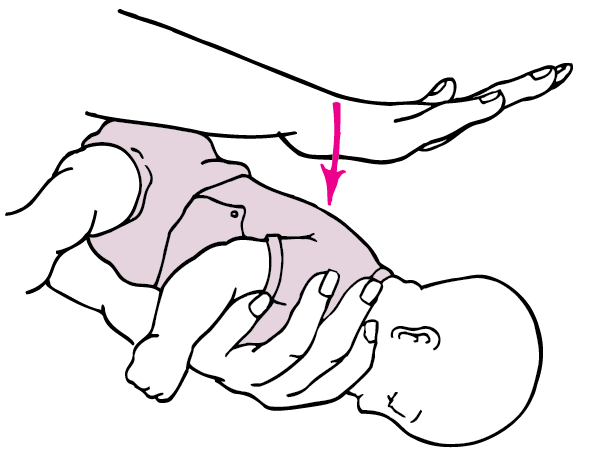Babies have to learn a lot of things at one time. One of the things that they have to get used to is swallowing. Drinking a bottle involves learning how to alternate between breathing, sucking, and swallowing.
Little ones that are really hungry and gulp down their milk are more likely to choke, but any baby can choke. Fortunately, there are a few things that you can do to make sure that your little one is okay.
1. If They Are Coughing, Let Them Be (Unless They Need To Sit Up)
It’s an instinct for most people to want to do something as soon as they see a baby choking. However, if your little one is coughing, you should let them be. Sitting them up is all that you need to do if they are laying down. Don’t pat them on the back.
If your little one is coughing, it means that they are still getting enough air through their airways to be able to cough.
It also means that their body recognizes that they are choking and that they need to spit up whatever is in their throat. Coughing is the body’s natural way of trying to deal with this.
When you instantly start patting your little one on the back, it can actually make the situation worse. If they are choking on a big swallow of milk, it can push it further down in their throat.
This is counterproductive because their body needs to cough it up. It can also lodge it in their throat and cut off their oxygen, making it necessary to perform the Heimlich maneuver.
Sit Them Up
If your baby or child is laying down, sit them up. It can be harder for the body to cough up things when it is laying down.
View in gallery
That’s why most of us instantly sit up when we are choking. However, your baby might not be able to sit up. If they are sick or tired they might not have the energy to sit up.
If they attempt to spit up something while they are laying down, it can wind up in their mouth. Then, they will swallow it again. This leads to them choking again.
However, if you make sure that they are sitting up when they choke, they are more likely to spit it out. This is because the body is better able to use the muscles in the tongue and mouth to propel the milk forward and out of the body.
Even if your child knows how to sit up on their own, don’t leave them laying down when they are choking. Make sure to sit them up.
2. Remove The Milk Yourself
Keep in mind that this should only be done as a last resort. If your baby is choking, you need to act fast. Grab a nasal syringe, and suction out the milk.
Even if you can’t get all of the milk out of their throat, you should be able to remove at least a small portion of it. This could be just enough to help them spit up the rest of it.
Remember, you should only do this if your little one has a hard time spitting up the milk on their own. If they are still coughing, leave them be. Simply hold them in an upright position.
3. Perform The Heimlich Maneuver
View in gallery
If you didn’t learn this yet, it’s never too late and always a good idea. Most pediatricians can point you in the right direction to learning this as well as CPR.
If you have learned it, and your baby is having difficulty breathing, don’t hesitate to perform this maneuver.
If you haven’t learned it, here’s a quick guide to get you through an episode of choking until you get into an official first aid course to provide proper instruction and practice.
Hold your baby so that their face is in your hand and pointed down at the floor. Their feet should be at your side, and their body at a slight downwards angle.
Then, firmly hit them with the heel of your hand in between their shoulder blades. This may take two or three quick thrusts of your hand into this area.
Some people are worried that they will hit their children too hard. However, that’s unlikely. Also, in the event of an emergency, it’s better to take a chance of accidentally leaving a bruise than to risk your baby dying.
When To Call For Help
As soon as your little one starts having a hard time breathing, call 911. If you’re concerned about your little one choking, call 911.
A 911 operator can talk you through performing emergency medical procedures, such as the Heimlich maneuver so that you can save your baby’s life. Remember, it’s always better to call 911 and wind up not needing help than waiting and it is too late.
When To Call Your Pediatrician
If your little one seems to constantly choke when eating, it’s time to call your pediatrician. It’s normal for babies to choke every so often, but frequent choking can be a sign of a larger problem.
Your pediatrician can rule out anything in their anatomy that might make them choke. They can also make wonderful recommendations.
For example, my grandbaby was born a preemie and then fed through a tube. Because of this, it took him a little bit longer to learn how to suck and swallow without choking.
As a preventative measure, he had to be fed while laying on his side. Then, if there was too much formula in his mouth, it would simply leak back out instead of going down his throat and choking him.
In Conclusion
When you see your little one choking, it can instantly send off alarm bells. However, these tips can help you make sure that your baby is okay. Don’t forget to always call 911 or your doctor if you’re concerned!
Medical Disclaimer. All content and media on the MomInformed Website is created and published online for informational purposes only. It is not intended to be a substitute for professional medical advice and should not be relied on as health or personal advice.






